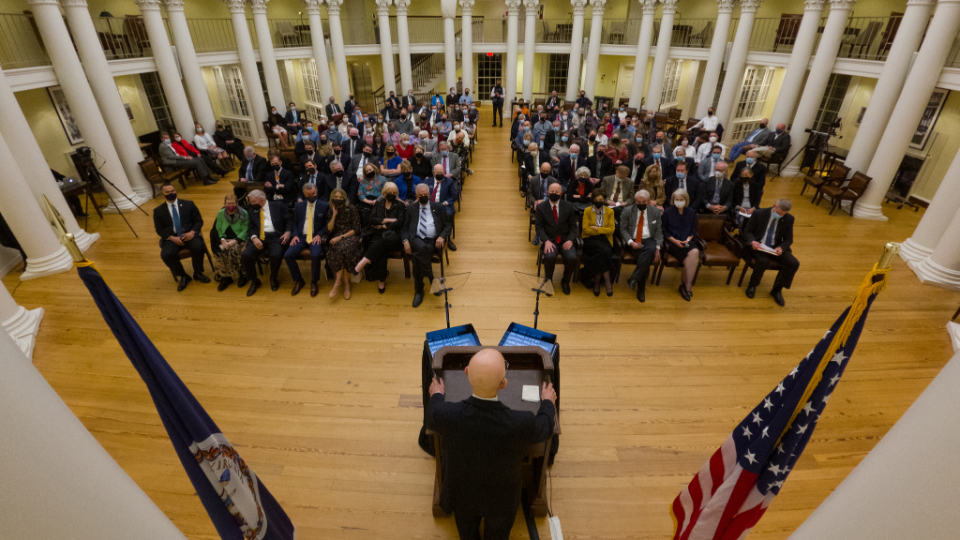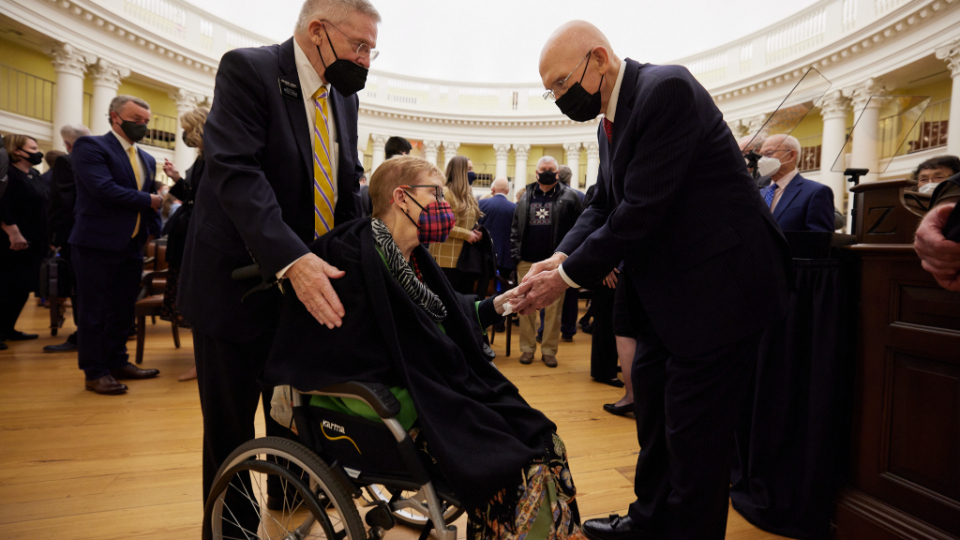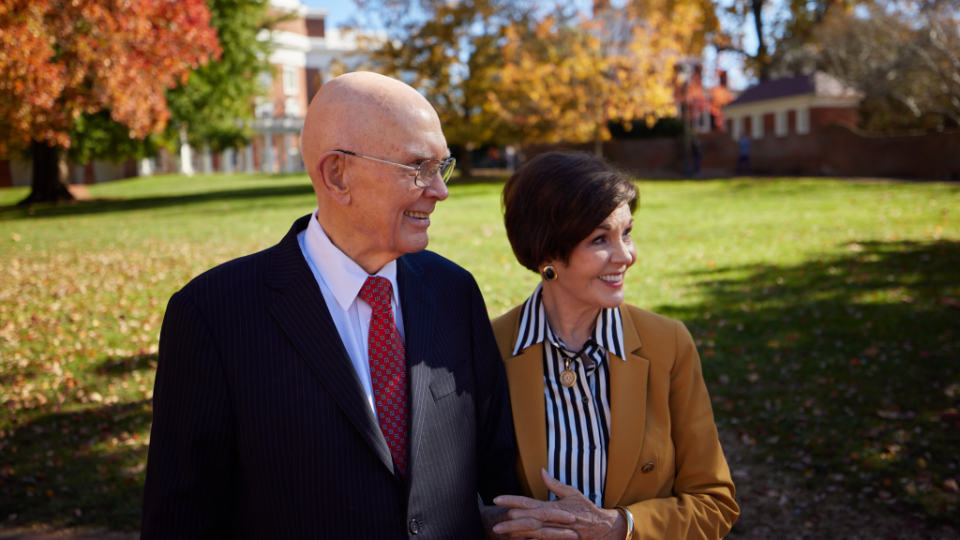Although current divisions among the religious and secular in the United States are distressing and complex, President Dallin H. Oaks of the First Presidency is advocating a better approach to current conflicts.
Delivering the University of Virginia’s 2021 Joseph Smith Lecture on religious liberty on Friday night, the Apostle of The Church of Jesus Christ of Latter-day Saints and First Counselor in the First Presidency said that “we now need a new, workable balance between religious freedom and non-discrimination.” He pointed believers to a “better way” by stressing the Christ-centered virtues of loving, listening, respecting, negotiating, persuading, balancing, tolerating, cooperating, reconciling, accommodating — any peaceful means that focus on the common good and “resolve differences without compromising core values.”
“We should accept the reality that we are fellow citizens who need each other,” President Oaks said.
-
- 20211112_122254_Bell_CMB_4555.jpg
- 20211112_121928_Bell_CMB_4366.jpg
- 20211112_171908_Bell_DJI_0227.jpg
- Dallin-H.-Oaks-University-of-Virginia
- Dallin-H.-Oaks-University-of-Virginia
- oaks-virginia-greeting.jpg
- Dallin-H.-Oaks-University-of-Virginia
- 20211112_185426_Bell_CMB_7642.jpg
- G0100076.jpg
- 20211112_182030_Bell_CMB_7213.jpg
- 20211112_184814_Bell_CMB_7486.jpg
- 20211112_180345_Bell_CMB_6534.jpg
- 20211112_180212_Bell_CMB_6430.jpg
- 20211112_175904_Bell_CMB_6333.jpg
- 20211112_181544_Bell_CMB_7097.jpg
- 20211112_180515_Bell_CMB_6697.jpg
- 20211112_181635_Bell_CMB_7151.jpg
- 20211112_184142_Bell_CMB_7377.jpg
- 20211112_181355_Bell_CMB_7054.jpg
- Dallin-H.-Oaks---University-of-Virginia
- Dallin-H.-Oaks-University-of-Virginia
- Dallin-H.-Oaks-University-of-Virginia
- Dallin-H.-Oaks-University-of-Virginia
- 20211111_115307_Bell_CMB_2306.jpg
- 20211111_165104_Bell_DJI_0080.jpg
- 20211111_171714_Bell_DJI_0126.jpg
- 20211111_140146_Bell_CMB_2613.jpg
| Temple Square is always beautiful in the springtime. Gardeners work to prepare the ground for General Conference. © 2012 Intellectual Reserve, Inc. All rights reserved. | 1 / 2 |
Instead of depending on litigating issues in courts where winners are proclaimed and losers are shamed, he proposed that religious leaders and associations should more often come together and approach adversaries through legislation and other efforts to “seek peaceful resolution of painful conflicts between religious freedom and non-discrimination.”
Such an approach among believers of different denominations, he said, does not require an analysis of doctrinal differences or a deep dive into the particulars of belief.
“All that is necessary for unity and a broad coalition to promote our common need for religious freedom,” he said, “is our shared conviction that God has commanded us to love one another, including our neighbors with different beliefs and cultures. This invites all believers, as President Russell M. Nelson has challenged our members, to ‘expand our circle of love to embrace the whole human family.’”
President Oaks said we should avoid being “unduly influenced” by extreme voices because “they polarize and sow resentment” in their quest for zero-sum victories. “Such outcomes are rarely sustainable or even attainable, and they are never preferable to living together in mutual understanding and peace.”
President Oaks also said we should not let fear of the potential loss of some of our own freedoms blind us to the freedoms of others.
“Let us unite with those who advocate non-discrimination to seek a culture and laws that respect the rights of all to the equal protection of the law and the right to the free exercise of religion,” he said. “The right relationship between religious freedom and non-discrimination is best achieved by respecting each other enough to negotiate in good faith and by caring for each other enough that the freedom and protection we seek is not for ourselves alone. I pray for that result under our inspired [United States] Constitution, as we pledge to be ‘one nation under God, indivisible, with liberty and justice for all.’”

G0100076.jpg
President Dallin H. Oaks of the First Presidency delivers the 2021 Joseph Smith Lecture in the Dome Room of the Rotunda at the University of Virginia on Friday, November 12, 2021.2021 by Intellectual Reserve, Inc. All rights reserved.The Example of the Utah Compromise and the Reed Smoot Hearings
President Oaks pointed to the six-year legislative process in Utah (2009–2015) to negotiate the different desires of advocates of religious freedom and the LGBT community. The resulting law, dubbed the “Utah Compromise,” defined religious freedom and also gave protections in housing and employment for LGBT people.
“I must add that the Utah Compromise required more than political engagement,” President Oaks said. “Essential to our side was the principle of honoring both divine and mortal laws. Rendering to Caesar in good faith requires religious persons and associations to acknowledge what their government does for them and to be faithful in fulfilling the reciprocal responsibilities they owe to the government and their fellow citizens. All should observe the laws and respect the values of the country that guarantees their freedoms. This is a debt of gratitude that should be paid gladly.”
And what if neither side is willing or able to make concessions that lead to reconciliation? “Such circumstances rarely exist,” President Oaks said. If they do, an episode from the early 20th-century history of the Church of Jesus Christ suggests a way forward: The national debate between 1903 and 1907 over letting Reed Smoot, an Apostle, keep his United States Senate seat. Many didn’t want Smoot in office because of his Church leadership role and some of the faith’s practices.
Quoting scholar Kathleen Flake, the chair of Mormon Studies at the University of Virginia, President Oaks said the Smoot hearings “hammered out a 20th-century model for church-state relations, shaping for a new generation of Americans what it meant to be free and religious.” Both sides were able to “preserve the deepest interests of the greatest number of parties.”

oaks-virginia-greeting.jpg
President Dallin H. Oaks of the First Presidency greets audience members in the Dome Room of the Rotunda at the University of Virginia on Friday, November 12, 2021.2021 by Intellectual Reserve, Inc. All rights reserved.“That is the essence of constructive politics,” President Oaks said, “which is something to be emulated in our own day. Indeed, the terms for maintaining a workable relationship between church and state that emerged from the Smoot hearings are applicable to all sides today: obedience to the law, political toleration and commitment to the common good.”
Seeing the Fruits of Faith
President Oaks said religious freedom ultimately depends on two things. The first is that the public appreciates and supports the freedoms of religious conscience, association and free exercise that are promised in the First Amendment.
“As a Church, we are committed to the free exercise of religion to allow us to practice the principles of our faith,” he said. “But we are also committed to fundamental fairness and the rule of law.”
The second key to sustaining religious freedom, he said, is that people must see the positive value that faith of all kinds adds to society — such as those highlighted in a recent cover story in Christianity Today.
“Teachings based on faith in God — however defined — have always contributed to moral actions that benefit the entire nation,” he said. “This will continue to be so as religious people love and serve their neighbors as an expression of their love of God. … In this way, more than any other, the importance of religious freedom will be better understood and better protected.”
President Oaks is the seventh person to deliver the Joseph Smith Lecture, which gives particular emphasis to religious liberty and civic leadership. The other speakers include U.S. Senator and former vice presidential candidate Tim Kaine, U.S. Ambassador-designate to Turkey Jeff Flake and former U.S. Senator Harry Reid.

20211112_122254_Bell_CMB_4555.jpg
President Dallin H. Oaks and his wife, Kristen, arrive on the University of Virginia campus on Friday, November 12, 2021.2021 by Intellectual Reserve, Inc. All rights reserved.Response to President Oaks’ Talk
Kathleen Flake, Chair of Mormon Studies at the University of Virginia
“We knew that we would be taught. But I think this was something that we couldn’t have imagined — the authority with which he spoke, the wisdom, the sense of urgency he conveyed both about his love for the nation and what he thinks we need to do. He very carefully identified when he was talking to the Latter-day Saints [and] when he had a message for the larger public. And both of those were just really important things to say in this day and time. … As I talked to my colleagues who were in attendance, they heard the message and they welcomed it. And they look forward to what the future might hold.”
Douglas Laycock, Robert E. Scott Distinguished Professor of Law and Professor of Religious Studies at the University of Virginia
“I think it’s an important and historic speech. There’s an obvious deal to be done between the gay rights community and the conservative religious community. … It’s one thing for a law professor to say that, but for a senior leader of a pretty conservative church to say we need to accept non-discrimination laws, we need to respect our fellow Americans whom we deeply disagree with on important moral issues, we need to find a way to live together — that’s hugely important. … It’s hard to move public opinion, but every little bit helps. This is a very important voice.”
Thomas Griffith, former judge on the U.S. Court of Appeals for the D.C. Circuit
“Tonight, [President Oaks] was speaking primarily to people of faith and telling us you need … to compromise for the sake of unity. There are people out there who have been deeply hurt and deeply wounded, and our duty as citizens, and I would as Christians, is to understand that pain and to do everything we possibly can do to address it. The calculation is that if people of faith act that way, then hopefully there’ll be some reciprocal understanding as well.”
“If you want to defend and support the Constitution, you act in the spirt of amity, love and mutual deference, respecting others and trying your best to accommodate their needs. That’s what this Constitution is about. I’m not certain I’ve heard a more articulate defense or explanation of the Constitution than I heard tonight.”
Tim Schultz, President of the 1st Amendment Partnership
“All Americans should hear [this address] because we have a lot of problems in our country, we have a lot of division, not least over these questions of religious freedom and LGBT rights. He charted a path forward that I think people should take heed of. … Other religious leaders should understand, both from what he said and the example of Utah, that passing a law that protects folks who you don’t 100% agree with … doesn’t cause you to backtrack on what you teach about your faith at all. A lot of people in this era of identity politics have a hard time seeing how you can both be yourself authentically but then support others authentically. Especially for religious leaders, that’s the message they need to hear.”
